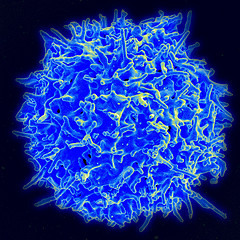22 January 2015. Autolus Ltd., a new enterprise developing engineered immune-system cells for treating cancer, is being formed in London, with £30 million ($45.4 million) in early financing. The company is founded and commercializing research by Martin Pule, a hematologist at University College London.
Pule, who serves as Autolus’s chief scientist, studies T-cells, white blood cells in the body’s immune system that hunt invading pathogens or help other T-cells protect against invaders. His research centers on harnessing a cancer patient’s own T-cells to battle cancer viruses, by reprogramming the T-cells to recognize and kill cancer cells, which the patient’s T-cells cannot do in their original state.
That reprogramming adds a new element to the surface of T-cells, a chimeric antigen receptor that enables T-cells to find identifying proteins on tumor cells, marking them for destruction. Chimeric antigen receptor-enabled T-cells, known as CAR T-cells, are then cultured and produced in the lab in large quantities and infused back into the patient.
Recent clinical trials are showing success with engineered CAR T-cells in treating cancer. An early-stage trial at Children’s Hospital of Philadelphia reports 90 percent of children and adult patients achieving full remission of their acute lymphoblastic leukemia. The technology is also attracting significant private investment in the past two months, with Amgen paying Kite Pharma $525 million to license each of Kite’s CAR T-cell programs, and Juno Therapeutics — a developer of CAR T-cell cancer treatments — raising $265 million in its IPO.
Autolus says its technology, based on Pule’s research, overcomes some early drawbacks of CAR T-cell treatments: limited applicability to solid-tumor cancers, serious adverse side effects from the immune reaction created by CAR T-cells, and toxicity to healthy tissues. When returned to patients, CAR T-cells proliferate in the body to fight cancer cells, but they also release large numbers of signaling cells called cytokines that can lead to high fever and sharp decline in blood pressure, according to National Cancer Institute.
The company is being launched by UCL Business, the university’s technology transfer unit, and Syncona Partners, a life sciences investment company in the U.K. Syncona Partners, the financier for Autolus, is a subsidiary of the Wellcome Trust, a leading science funding organization in the U.K. Founded in 2012, Syncona is an evergreen investor — one that provides revolving credit over a period of time — and currently supports five enterprises including Autolus.
Read more:
- Amgen, Kite Pharma Partner on Personal Cancer Immunotherapy
- Juno Therapeutics Raises $265 Million in IPO
- Personalized Leukemia Immunotherapy Gets 90 Pct Remission
- Biotech Company Licenses Caltech Immunotherapy Research
- Immunotherapy Start-Up Adds $134M in Venture Funding
Hat tip: Fierce Biotech
* * *


 RSS - Posts
RSS - Posts
You must be logged in to post a comment.